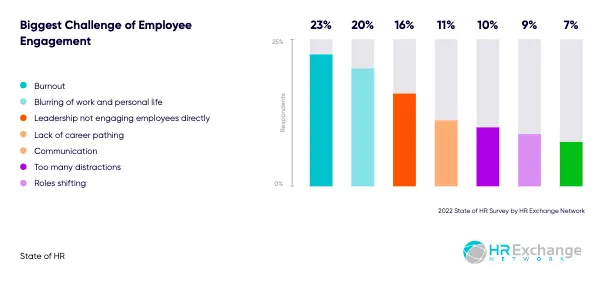In today's fast-paced and demanding work environment, employee well-being has emerged as a critical factor for organisational success. A survey by HR Exchange in 2022 revealed a sobering truth burnout was the leading cause of diminished employee engagement, a cornerstone of business productivity and growth. As companies grapple with the mental health challenges faced by their workforce, the role of Human Resources (HR) has taken centre stage. We at Spurt!, offer a compelling case study on how HR can champion mental health initiatives, fostering a supportive and thriving workplace culture.

Now, why should you, as an HR professional, care?
Beyond being the ethical and humane course of action, prioritising mental health is crucial to ensuring your business objectives don't falter. Unaddressed mental health concerns can pose severe threats to your organisation in the following ways:
Reduced Productivity and Engagement: When employees struggle with mental health issues, their focus, motivation, and overall productivity can decline significantly. This manifests in tasks taking longer, an increase in mistakes, and a general lack of investment in their work.
Negative Impact on Company Culture: Mental health challenges can breed conflict, negativity, and a decline in team morale, fostering a toxic work environment that further impedes productivity and employee retention.
As the HR Manager, how do you come into this story?
As the HR manager, you are uniquely positioned to champion the mental health cause within your company. Raising awareness through workshops, events, and initiatives can empower your workforce to strengthen their psychological well-being. HR should educate employees, dispel myths, and create a safe, judgment-free haven for those seeking help. At Spurt!, we have implemented key strategies to support our team's mental health journey:
Eliminate the Stigma and help promote awareness: We combat misconceptions by educating our teams about the realities of mental health conditions, and fostering an environment of understanding and acceptance (mental health isn’t a communicable business). Ensure the right conversations are had.
Training and Education: We organize sessions, provide resources, and partner with experts to properly diagnose and treat mental health issues. Developing comprehensive guides equips our teams with the knowledge to support their colleagues effectively. In the past year at Spurt! we have partnered with experts to come talk to us on important topics surrounding mental health, encouraging our members to even book slots and use their services to help improve the mental health of teammates.
Check-ins: Regular check-ins allow us to gauge our employees' well-being, identify potential concerns early on, and offer support and encouragement tailored to their needs. Schedule these calls weekly or monthly, so you’re sure to encourage them to speak.
Engaging Activities: A remote team like ours means we all work from home so once a week every Thursday we just don’t learn something new we also get to play games, this is a sample of a bingo game we played which centred around mental health it helped us gauge and understand who’s a 100 and who needed a break. We also have Book club at the end of every quarter we also have our book club where we come together to discuss a book we have read within the quarter.

In the face of rising mental health challenges in the workplace, HR professionals are uniquely positioned to drive positive change. By championing mental well-being initiatives, fostering open dialogues, and implementing practical strategies, HR can cultivate a supportive and inclusive environment where employees thrive.
As the guardians of an organisation’s most valuable asset – its people – HR professionals have a unique opportunity to spearhead mental health awareness and support programs. By doing so they uphold ethical practices, contribute to long term organisational success, and unlock the full potential of their workforce. Embracing their role as champions of mental well-being is not only the right thing to do but a strategic imperative for any forward thinking organisation.



